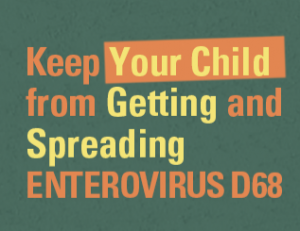
Image Credit: CDC.gov
There’s a lot of hype surrounding the enterovirus that’s been going around lately. Many people seem to think that enterovirus is a new and unusual supervirus that’s sweeping through the nation like wildfire.
The truth is, though, enterovruses are actually very common. There are several different strains of the virus that cause several different types of illnesses. Enterovirus D68, is a somewhat rare strain of the virus. Until recently, this particular virus has only caused only small isolated outbreaks.
Starting in mid-August 2014, however, several confirmed cases of enterovirus D68 have sprung up across the United States. While it hasn’t quite caused a massive epidemic, people are starting to worry and become more concerned. Parents in particular are worried, since this virus seems to affect infants and children the most.
According to the Centers for Disease Control, a total of 140 people in 16 states have been confirmed to have respiratory illness caused by EV-D68 from mid-August to September 17, 2014. States affected include:
- Alabama
- Colorado
- Connecticut
- Illinois
- Indiana
- Iowa
- Kansas
- Kentucky
- Louisiana
- Missouri
- Montana
- Nebraska
- NewYork
- Oklahoma
- Pennsylvania
- Virginia
While this may not seem like a huge outbreak, it doesn’t hurt to be prepared. Make sure you know the signs and symptoms of enterovirus D68 as well as how to prevent to spread of the virus.
Symptoms of Enterovirus D68
Enterovirus D68 causes symptoms similar to the common cold or flu and may even be misdiagnosed because of this. Many enterovirus cases involve mild symptoms, but some people, particularly children, may have more serious symptoms.
Enterovirus D68 symptoms include:
- fever
- runny nose
- sneezing
- coughing
- wheezing
- body and muscle aches
Treatment for Enterovirus D68
Like many viral illnesses, there is no official treatment for enterovirus D68. Over-the-counter medications may help relieve symptoms such as fever and aches. The illness will usually run its course within a week.
Since this virus affects the respiratory system, hospitalization for severe symptoms may be necessary. Talk to your doctor or your child’s pediatrician if symptoms become severe or wheezing or difficulty breathing occur.
Preventing Enterovirus D68
Prevention is key when it comes to viruses like enterovirus D68. To help halt the spread of this illness, it’s imperative that you take steps to protect yourself and others.
- Stay home if you are sick, and keep your children home if they are sick.
- Cover your nose and mouth with the crook of your elbow when you sneeze and cough.
- Wash hands frequently with soap and hot water for at least 20 seconds.
- Do not touch your eyes, nose, or mouth with unwashed hands.
- Do not kiss, hug, or eat or drink after people who are sick.
- Disinfect frequently touched surfaces, including toys and doorknobs, especially if someone is sick.






